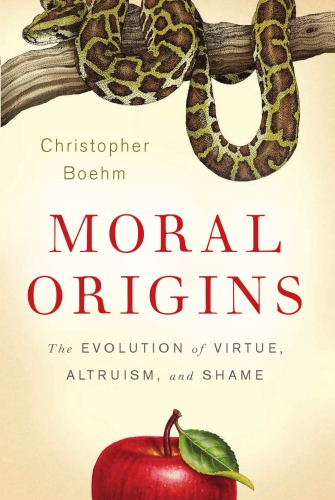
Moral Origins
The Evolution of Virtue, Altruism, and Shame
کتاب های مرتبط
- اطلاعات
- نقد و بررسی
- دیدگاه کاربران
نقد و بررسی

Starred review from February 20, 2012
The evolutionary origins of morals in humans has been a concern of scientists since Darwin. As Boehm, director of the Jane Goodall Research Center and professor of anthropology and biology at the University of Southern California, points out in his engrossing work, the issue is far from settled. Boehm does a remarkable job of extending previous work and incorporating a historical approach. He deftly combines studies of earlier hominids with ethological work on primates and ethnographic analyses of contemporary human hunter-gatherer groups to offer a new explanation for moral behavior. Boehm argues that social selection, or “intense social control” in prehistoric humans worked so well because “intense social control” meant “that individuals who were better at inhibiting their own antisocial tendencies, either through fear of punishment or through absorbing and identifying with their group’s rules, gained superior fitness.” His thesis, clearly articulated and well supported by available data, encompasses the egalitarian nature of most hunter-gatherer groups, their need to share large but rarely killed prey, and the human penchant for gossiping about the reputation of others. Social control explains how both dominance and free-loading behavior will be less favored than altruism. Boehm himself notes that this may not be the last word, but his ideas are provocative, thoughtful, and worth considering. Agent: Deirdre Mullane, Mullane Literary Associates.

March 1, 2012
Boehm (Anthropology and Biological Sciences/Univ. of Southern California in Los Angeles; Hierarchy in the Forest: The Evolution of Egalitarian Behavior, 1999, etc.) probes the origins of human conscience and altruism. Trained as an evolutionary biologist, the author is the director of the Jane Goodall Research Center. He questions why altruistic behavior--"being generous to people lacking any blood ties to the generous party"--is a matter of everyday human practice, theorizing that generosity and other moral virtues evolved genetically according to the principle of natural selection as a byproduct of social selection, which rewarded impulse control and punished aggressive behavior. Boehm suggests that egalitarian hunter-gatherer groups would have needed strong social controls to ensure cooperation and equitable sharing of the kill. This, he contends, could have caused a biological shift. While highly competitive Chimpanzee alpha males dominate and receive disproportionate shares of food and sexual favors--thus gaining competitive advantage for the perpetuation of their genes--in hunter-gatherer societies such behavior could not be tolerated and would confer a reproductive disadvantage. The universal existence of blushing as an expression of shame exists only among humans; therefore, writes the author, it must be genetically based rather than just a cultural phenomenon. Boehm cites recent work establishing the existence of empathy, undoubtedly a precursor to morality, in primates, but he contends that altruism and shame are distinctly human qualities. People recognize virtue and feel shame; animals seek approval and fear disapproval. Boehm also cites instances in which Inuits and Pygmy tribes have used gossip and shaming to discipline would-be freeloaders, and even harsher methods to deal with bullies, thieves and murderers. A provocative though speculative thesis related in a chatty, occasionally repetitive style.
COPYRIGHT(2012) Kirkus Reviews, ALL RIGHTS RESERVED.

May 1, 2012
This book asks the question, "Why is altruism present in modern human beings?" and explores whether altruism has a biological basis. Boehm (director, Jane Goodall Research Ctr., Univ. of Southern California, Los Angeles; Hierarchy in the Forest: The Evolution of Egalitarian Behavior) argues that altruism is inborn and, after outlining three possible scenarios from which human "moral origins" could have arisen, explains which one is the best supported by the evidence. As part of his argument about the evolution of generosity and cooperation, Boehm discusses the nature of human social organizations and how this contributed to the modern human conscience. VERDICT Basing his work on thorough reading of anthropological literature and archaeological data, Boehm uses creditable sources to make his case. The scholarly language and concepts make this an unlikely choice for a lay reader. However, it is an excellent choice for university courses in anthropology, sociology, psychology, ethics/philosophy, or biology.--Rebecca M. Marrall, Western Washington Univ. Libs., Bellingham
Copyright 2012 Library Journal, LLC Used with permission.

April 15, 2012
How did evolution produce a species that blushes? To explain the uniquely human moral sense, Boehm teases a provocative neo-Darwinian theory out of cutting-edge archaeological, anthropological, and psychological research. In this theory, the human conscience emerges as prehistoric tribes learn to share the meat of mammoths and other large game. The constraints of sharing, Boehm believes, made early humans newly resistant to the demands of despotic alpha males but responsive to internalized rules for virtuous behavior. In placing group behavior at the very center of his account of moral rules and the reproductive success they foster, Boehm defies the egocentric, or selfish gene, bias that pervades much of evolutionary theorizing. But this defiance opens surprising insights into the hidden biological logic of altruistic acts that benefit nonkin and of harsh tribal punishments that hold free riders in check. Some readers may find Boehm's conception of morality, bereft of religious conviction or philosophic reflection, unsatisfyingly thin. But those looking for a daring new application of empirical science will find it here.(Reprinted with permission of Booklist, copyright 2012, American Library Association.)

























دیدگاه کاربران